Podcast
Questions and Answers
When did the notion of untouchability take roots in Indian society?
When did the notion of untouchability take roots in Indian society?
- During the Gupta period
- During the Vedic period
- During the last phase of the Vedic period (correct)
- During the age of the Buddha
What was the main task of the untouchables?
What was the main task of the untouchables?
- Hunting and fishing
- Farming and agriculture
- Carrying and cremating corpses (correct)
- Weaving and basket making
What was the term used loosely for many types of untouchables?
What was the term used loosely for many types of untouchables?
- Nishada
- Chandala (correct)
- Panchamd
- Antyajas
What were the hunters, fishermen, and leather workers considered as?
What were the hunters, fishermen, and leather workers considered as?
What was the status of the untouchables by the Gupta period?
What was the status of the untouchables by the Gupta period?
What is the current status of the practice of untouchability in India?
What is the current status of the practice of untouchability in India?
Flashcards are hidden until you start studying
Study Notes
The Concept of Purity and Pollution in Indian Society
- The concept of purity and pollution in Indian society led to the formation of a category known as untouchables (antyajas), who were considered outside the Brahmanical society.
Origins of Untouchability
- The notion of untouchability took roots during the last phase of the Vedic period and became a separate social category in the age of the Buddha.
Types of Untouchables
- Chandala is a term used loosely for many types of untouchables, including hunters (nishada), fishermen (kaivartas), leather workers (charmakaras), sweepers (kukkusa), and basket makers (vend).
Living Conditions and Restrictions
- Untouchables were not allowed to reside in caste villages and had to stay in special quarters outside the main settlements.
- They were forced to wear iron ornaments, dress in the garments of the corpses they cremated, and eat food from broken vessels.
Decline in Status
- By the Gupta period, their status had fallen so much that they were forced to strike a wooden clapper on entering a town.
Other Untouchable Categories
- The 'Dom' and 'Domb' tribe became an untouchable category after coming into contact with caste-divided groups.
- Mlechchas were also considered untouchables.
Efforts to End Untouchability
- Mahatma Gandhi initiated a campaign against the practice of untouchability, referring to them as "Harijans".
- The Government of India has enacted laws against practicing or promoting untouchability.
- Education and social movements have contributed towards bridging the gap between untouchables and others.
Current Status
- Although the practice of untouchability is considered a crime, it still continues in rural areas.
- It is hoped that this inhuman practice will soon be wiped out.
Studying That Suits You
Use AI to generate personalized quizzes and flashcards to suit your learning preferences.




